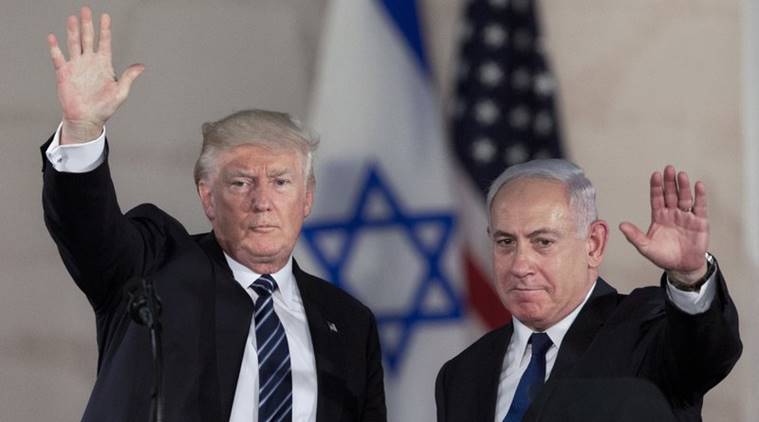The reasons for the muted response to Prime Minister Benjamin Netanyahu’s preelection promise Tuesday were many: It was seen as a late-game appeal by Netanyahu to right-wing voters.
Written by Ben Hubbard
At one time, if the prime minister of Israel had vowed to extend Israeli sovereignty over the Jordan Valley in the occupied West Bank, the unilateral promise would have set off outrage across the Arab world.
Not today.
The reasons for the muted response to Prime Minister Benjamin Netanyahu’s preelection promise Tuesday were many: It was seen as a late-game appeal by Netanyahu to right-wing voters. Israel already has de facto control of the territory in question. And the Palestinian cause no longer stirs passions across the region as it once did.
“Yes they care,” Palestinian journalist Daoud Kuttab said of Arabs in other countries. “But will they move their troops? No. Are they going to withdraw their money from American banks? No.”
Netanyahu’s vow comes after strategic shifts in the Middle East have pushed the Palestinian cause down the priority list of many Arab leaders and their peoples. It also follows President Donald Trump’s endorsement of a number of unilateral steps by Israel toward other disputed territories.
Across the region, Arab states like Egypt, Syria, Yemen and Iraq are still reeling from the aftermath of the Arab Spring uprisings and the fight against the Islamic State group, leaving them more focused on internal issues. And Persian Gulf monarchies like Saudi Arabia, which once staunchly backed the Palestinians, now worry more about Iran’s regional influence, a concern they share with Israel.
Those changes have left the Palestinians with fewer Arab allies willing to stand up for their cause.
“For the most part, the Palestinian issue has fallen off the agenda,” said Khaled Elgindy, a fellow at the Brookings Institution and author of a book about U.S. involvement in the conflict.
Arab leaders may also avoid denouncing Netanyahu and his plans because they are unwilling or unable to confront him. “It raises expectations,” Elgindy said. “If they say, ‘We oppose this. This is terrible,’ then there is an expectation from their people that they will do something about it.” That does not mean that the Arab public does not care, he said. Support for the idea of a Palestinian state remains a rare issue that still generates broad consensus across the Arab world, even if people are not out protesting about it.
The issue is particularly sensitive for Jordan, a close U.S. ally that has a peace treaty with Israel but sits across the Jordan River from the very territory Netanyahu seeks to annex.
On Tuesday, Ayman Safadi, Jordan’s foreign minister, criticized Netanyahu’s vow on Twitter as “a serious escalation that undermines all peace efforts.” “It’ll lead to more violence & conflict,” he wrote.
Trump’s unambiguous support for Israel over the Palestinians also played a role. While previous presidents sought to maintain an air of U.S. impartiality and often met with Palestinian officials as part of the effort to support a two-state solution, Trump has cast his lot with the Israelis. He has not met with Palestinian leaders, and he has ordered the closure of the Washington office of the Palestine Liberation Organization.
Trump has also changed U.S. policy by endorsing unilateral Israeli actions toward disputed territories. He recognized Jerusalem as the capital of Israel and moved the U.S. Embassy there, a departure from the previous U.S. position that the status of the holy city should be determined through negotiations.
The Palestinians claim East Jerusalem as the capital of their hoped-for state in the West Bank and Gaza.
The Jordan Valley is the strip of territory on the western side of the Jordan River in the West Bank, which Israel occupied in 1967. The area is now home to about 11,000 Israelis who live in Jewish settlements and about 65,000 Palestinians who live in the biblical city of Jericho and in farming and herding communities, according to B’Tselem, an Israeli rights group.
Ninety percent of the territory is already under Israeli administrative and military control, and Palestinians are barred from entering or using about 85% of it, the group says. Israel has long argued that control of the Jordan Valley is necessary for its security. Netanyahu on Tuesday called it “Israel’s eastern border.”
The Palestinians, human rights groups and many other nations argue that Israel cannot legally annex the territory, which the Palestinians need for their hoped-for state.
The Palestinian Authority president, Mahmoud Abbas, said in a statement that “all signed agreements with Israel and the obligations resulting from them would end” if Israel annexed the land.
Others noted that an actual Israel annexation of the Jordan Valley would leave most Palestinian areas in the West Bank surrounded, perhaps driving the final nail into the coffin of the two-state solution.
Kuttab, the Palestinian journalist, said that he still supported the idea of a Palestinian state but that his children had given up hope, feeling that Israel has already seized too much land to make it possible. “They say that with so many settlements in the West Bank, there is no way to create a state,” he said. “So the better long-term solution is fighting for equality.”
Source: Read Full Article


